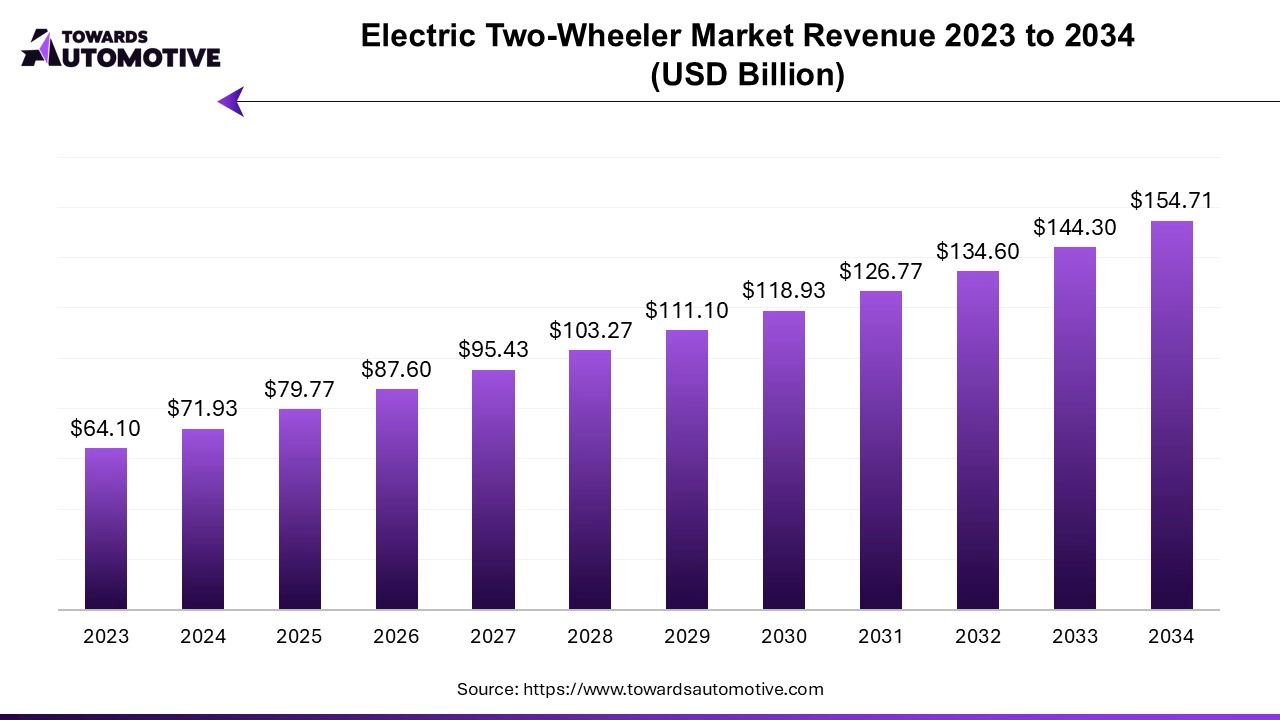The global electric two-wheeler market size is calculated at USD 71.93 billion in 2024 and is expected to be worth USD 154.71 billion by 2034, expanding at a CAGR of 7.21% from 2024 to 2034.

Get All the Details in Our Solution – Download Brochure @ https://www.towardsautomotive.com/download-brochure/1259
Key Takeaways
- Asia Pacific dominated the electric two-wheeler market.
- Europe is expected to grow with the highest CAGR during the forecast period.
- By battery type, the li-ion segment held the largest share of the market.
- By voltage, the more than 48V segment led the industry.
- By type, the electric scooters segment dominated the industry.
Introduction
The electric two-wheeler market is experiencing rapid growth driven by the increasing demand for sustainable transportation solutions and the rising awareness of environmental issues. As urban areas grapple with traffic congestion and air pollution, electric two-wheelers offer an efficient, eco-friendly alternative to traditional gasoline-powered vehicles. These vehicles are not only more affordable to operate due to lower energy costs but also contribute significantly to reducing greenhouse gas emissions. Government incentives, such as subsidies, tax rebates, and investments in charging infrastructure, further bolster the appeal of electric two-wheelers, encouraging consumers to make the switch from conventional bikes.
Technological advancements are also playing a pivotal role in the market’s expansion. Innovations in battery technology have led to improved energy density, longer ranges, and shorter charging times, addressing common consumer concerns about the practicality of electric two-wheelers. Manufacturers are continually investing in research and development to enhance the performance and safety features of electric bikes, making them more competitive with traditional options.
In addition, the growing trend of e-commerce and last-mile delivery services is propelling the demand for electric two-wheelers, particularly in urban areas where quick and efficient transport is essential. The rise of shared mobility services, including bike-sharing and ride-hailing platforms, further amplifies the market potential, as electric two-wheelers are increasingly integrated into these services.
As consumers prioritize sustainability and convenience, and as cities implement stricter emission regulations, the electric two-wheeler market is poised for significant growth. This trend is supported by a growing ecosystem of charging infrastructure, favorable policies, and consumer acceptance, solidifying electric two-wheelers as a viable and attractive mode of transportation in the modern urban landscape.
What is the Role of AI in the Electric Two-Wheelers?
Artificial Intelligence (AI) is revolutionizing the electric two-wheeler market by enhancing various facets of design, operation, and user experience. One of the primary roles of AI lies in smart battery management, where algorithms predict usage patterns and optimize charging cycles to extend battery life and improve overall range, addressing critical consumer concerns. AI also facilitates predictive maintenance, allowing manufacturers and riders to monitor vehicle performance in real time, identifying potential issues before they escalate, thereby minimizing downtime and repair costs.
Moreover, AI enhances user experience through intelligent navigation systems that learn individual preferences, offering optimized routes and traffic updates. Features like voice recognition and AI-driven interfaces further improve interaction, making riding more intuitive. In terms of safety, AI powers advanced driver-assistance systems (ADAS), integrating collision detection, emergency braking, and stability control features that analyze sensor data to help prevent accidents.
AI is also paving the way for autonomous capabilities in electric two-wheelers, enabling vehicles to analyze real-time environmental data for safer riding decisions. Additionally, AI plays a crucial role in market analysis, helping manufacturers identify trends and consumer preferences, ultimately driving product innovation. Supply chain optimization is another area where AI contributes by predicting demand and improving production efficiency, leading to reduced costs and better availability.
- In September 2024, Revolt Motors announced partnership with Evolution Auto Pvt. Ltd. This partnership is done to launch AI-enabled E-bikes in Sri Lanka.
Invest in Our Premium Strategic Solution @ https://www.towardsautomotive.com/price/1259
You can place an order or ask any questions, please feel free to contact us at sales@towardsautomotive.com
Explore the comprehensive statistics and insights on automotive industry data and its associated segmentation: Get a Subscription
For Latest Update Follow Us: https://www.linkedin.com/company/towards-automotive
